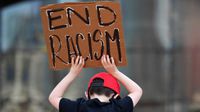
“South Africans of all colours and backgrounds proclaimed freedom and justice as their unquenchable aspiration. They pledged loyalty to a country which belongs to all who live in it.” – former President Nelson Mandela at the Signing of the Constitution of the Republic of South Africa at Sharpeville on 10 December 1996.
With this signing of the country’s supreme law, non-racialism was entrenched as one of democratic South Africa’s Founding Provisions.
Non-racialism, as the term clearly indicates by the existence of the prefix “non”, illustrates that race, should not be, in any and all cases, used to determine the suitability of an individual in partaking in activities or applying to institutions of higher learning, or any situation for that matter where race could be construed as an arbiter of societal position or the advantages or disadvantages of being a certain skin colour in a social setting.
Just like in the days under the National Party government and the system of Apartheid, racial categories are used today, in a relatively modern, democratic, free and supposedly non-racial South Africa to address historical injustices committed under Apartheid, to redress and provide an opportunity for upliftment of those classified as “Historically Disadvantaged Individuals (HDIs)”.
Now, nobody in this nearly 60-million-large South African populace can be against the wholescale upliftment of the most destitute and needy. But we have our differences. Sometimes the differences are small, and can be reconciled to each other, but racial categorisation is a form of difference which is irreconcilable: a deep problem that needs to be fixed.
Some HDIs are still indeed historically disadvantaged, even if we do not see race as an arbiter of societal position. That is because of the legacy of apartheid, and through policies such as ‘job reservation’. This can still be seen today. For example, this can be seen in a 2018 Statistics South Africa study on poverty and inequality, done in collaboration with the World Bank. The foreword was written by Dr Nkosazana Dlamini-Zuma in which she states, “the country’s socio-economic challenges are deep, structural and long-term.”
Yes, ma’am, but the way the government wants to fix it is not the most efficient or effective manner, i.e., through the adoption of what the study calls “redistributive policies” along with destructive affirmative action policies which are holding the country back from providing the necessary opportunities to those who need them most and threaten the flight of not only capital, but also experience.
Opportunities, growth and development are provided through skills creation and not restrictive race-based policies such as Employment Equity and Black Economic Empowerment.
Would you want to be held back from achieving your full potential because your skin colour is not what it should be?
With relative certainty, that answer is a resounding no.
Referring to the Statistics South Africa study, it raises the concern of “popular discontent around unemployment, poverty and equality”. Over the past four years this has deepened due to a continued insistence by government on low-growth, inhibitive economic and labour policies plus the unexpected effects of a public health crisis of magnetic proportions, at a time and in a place where these problems cannot afford to be ignored.
Apportioning blame to Apartheid (and the Coronavirus pandemic) is to shirk the responsibility of these three pressing crises, and especially so nearly thirty years into democracy. As leading economist, Thomas Sowell, aptly states, “blaming all differences on discrimination is profoundly misleading.” In that it distracts from the actual problem(s) facing South Africans, which are mentioned in the abovementioned paragraph.
In this case, the problems are given free license to continue ravaging our society while the government focuses on whether you fit the criteria to be given a job based on your skin. It is akin to playing pinball while the arcade is engulfed in a raging fire and on the verge of collapsing on you, yet you see no problem, because your focus is on that little ball. The fire represents the three crises which are in the process of consuming the arcade, which represents society, while, that little ball is Employment Equity and Black Economic Empowerment.
Be not afraid though, for all is not lost. Freedom-loving South Africans, who have the interests of the people at heart, will be able to rebuild. We will rebuild for the benefit, not of a minority, but of the majority who seek equal access to opportunity through merit, skills creation, education and allow them access to a Toolbox of Opportunity. Restrictions on employment seek to hurt those who need it most. It is oppressive and done for political objectives, at a time when nobody of any race can reasonably afford to be kept out of a job by a government who seeks the benefit of regulation for personal enrichment.
It is in the best interest for all to succeed. It is in the national interest not to be forced into a box under the illusion of fair racial discrimination. There is no such thing as fair racial discrimination. Fair racial discrimination is what the government says is necessary to redress Apartheid injustices, to equalise the playing field. That illusion of supporting redress is being used as an opportunity to disenfranchise individuals from their own potential. But they are wrong. And dearly so. Look where BEE has gotten us; record unemployment rates and perpetual years of low economic growth!
The time is now, to fix what has broken.
Cover image source available here.
